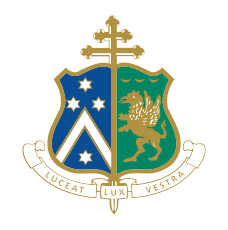A Jesuit Education
Since its founding in 1918, the administration of Newman College has been entrusted to the Society of Jesus. "To find God in all things" was the aim of St Ignatius Loyola and his Jesuit companions, who first formed a community at the University of Paris early in the 16th century.
Jesuit colleges and universities are committed to teaching and learning; scholarly research and creative activity; and service to local, regional and international communities; and in so doing, we fulfil our mission to promote the good of each and the good of all. Each academic institution has its own unique history, and yet they also share a common tradition of Ignatian pedagogy with each other and with more than 200 Jesuit works of higher learning around the globe. We are communities of teaching scholars for whom the many ways of learning are pursued in a grand conversation that seeks to find mutually enlightening connections among the many academic disciplines. Study of the Humanities, the Arts, the Social and the Natural Sciences are integrated, not only for their mutual enrichment, but also to suggest a holistic appreciation of the nature of reality in general and a comprehensive view of human beings in particular. We design academic programs that call upon the creative and the imaginative, the rational and the analytical, the intuitive and the self-reflective, for the full development of every student.
As academic institutions...
We embrace academic freedom because academic freedom is a core expression of our traditional respect for the autonomy of reason and the sovereignty of well-formed conscience. We believe that the life of the mind and the pursuit of the good are both a duty and a vocation.
We live out this call to free inquiry in ways that honour our habits and customs of intellectual rigor and respectful engagement with all persons and cultures, both by our particular agendas of research / creative activity and by conceptualizing, offering and assessing the quality of a wide variety of academic programs.
As Jesuit institutions...
We find in Ignatius of Loyola, founder of the Society of Jesus, a touchstone for all Jesuit institutions and projects. A stargazer, a pilgrim, a spiritual master and a true friend, Ignatius sensed the interconnectedness of everything. Four foundational spiritual insights of St. Ignatius animate our work:
- seeking and finding God in all things;
- care for the whole person (cura personalis);
- the art of discernment, and;
- the quest for the most excellent way of proceeding (the Magis).
The first two foundational spiritual insights about the nature of the cosmos and human beings promote ways of thinking and knowing and thus shape our academic programs. Seen within the context of the Catholic intellectual tradition in which the Jesuits have operated, "seeking and finding God in all things," properly understood, posits that the universe is meaningful rather than meaningless, that chaos, brokenness and finitude exist within a larger context of intelligibility and emerging order, and that human reason, while unable to exhaust the mysteries of the universe, has, can and will continue to advance the body of human knowledge about the nature and meaning of reality.
The latter two Ignatian insights, discernment and the Magis, inspire the distinct Ignatian pedagogy of our institutions. The first is a habit of integrating ways of learning/knowing with thoughtful decisions/actions. Ignatian formation led people to be "contemplatives in action," by which Ignatius did not mean alternate, discrete times of action and reflection, but rather mindfulness and attentiveness in the midst of our full personal and professional engagement. The active contemplative is fully present as a thinking and feeling person who is attentive to the needs of all the stakeholders in every decision, is just and ethical, practical and pragmatic, in a word, a person of integrity.

Ad maiorem Dei gloriam – for the greater glory of God
